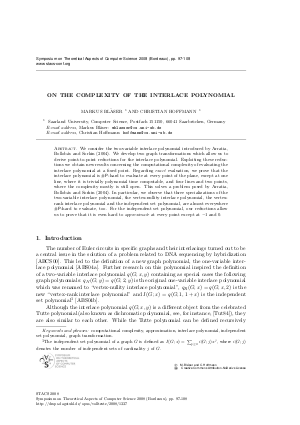On the Complexity of the Interlace Polynomial
Authors Markus Bläser, Christian Hoffmann
-
Part of:
Volume:
25th International Symposium on Theoretical Aspects of Computer Science (STACS 2008)
Part of: Series: Leibniz International Proceedings in Informatics (LIPIcs)
Part of: Conference: Symposium on Theoretical Aspects of Computer Science (STACS) - License:
 Creative Commons Attribution-NoDerivs 3.0 Unported license
Creative Commons Attribution-NoDerivs 3.0 Unported license
- Publication Date: 2008-02-06
File

PDF
LIPIcs.STACS.2008.1337.pdf
- Filesize: 209 kB
- 12 pages
Document Identifiers
Subject Classification
Keywords
- Computational complexity
- approximation
- interlace polynomial
- independent set polynomial
- graph transformation
Metrics
- Access Statistics
-
Total Accesses (updated on a weekly basis)
0PDF Downloads0Metadata Views
Abstract
We consider the two-variable interlace polynomial introduced by Arratia, Bollob`as and Sorkin (2004). We develop two graph transformations which allow us to derive point-to-point reductions for the interlace polynomial. Exploiting these reductions we obtain new results concerning the computational complexity of evaluating the interlace polynomial at a fixed point. Regarding exact evaluation, we prove that the interlace polynomial is #P-hard to evaluate at every point of the plane, except at one line, where it is trivially polynomial time computable, and four lines and two points, where the complexity mostly is still open. This solves a problem posed by Arratia, Bollob`as and Sorkin (2004). In particular, we observe that three specializations of the two-variable interlace polynomial, the vertex-nullity interlace polynomial, the vertex-rank interlace polynomial and the independent set polynomial, are almost everywhere #P-hard to evaluate, too. For the independent set polynomial, our reductions allow us to prove that it is even hard to approximate at every point except at $-1$ and~$0$.
Cite As Get BibTex
Markus Bläser and Christian Hoffmann. On the Complexity of the Interlace Polynomial. In 25th International Symposium on Theoretical Aspects of Computer Science. Leibniz International Proceedings in Informatics (LIPIcs), Volume 1, pp. 97-108, Schloss Dagstuhl – Leibniz-Zentrum für Informatik (2008)
https://doi.org/10.4230/LIPIcs.STACS.2008.1337
BibTex
@InProceedings{blaser_et_al:LIPIcs.STACS.2008.1337,
author = {Bl\"{a}ser, Markus and Hoffmann, Christian},
title = {{On the Complexity of the Interlace Polynomial}},
booktitle = {25th International Symposium on Theoretical Aspects of Computer Science},
pages = {97--108},
series = {Leibniz International Proceedings in Informatics (LIPIcs)},
ISBN = {978-3-939897-06-4},
ISSN = {1868-8969},
year = {2008},
volume = {1},
editor = {Albers, Susanne and Weil, Pascal},
publisher = {Schloss Dagstuhl -- Leibniz-Zentrum f{\"u}r Informatik},
address = {Dagstuhl, Germany},
URL = {https://drops.dagstuhl.de/entities/document/10.4230/LIPIcs.STACS.2008.1337},
URN = {urn:nbn:de:0030-drops-13378},
doi = {10.4230/LIPIcs.STACS.2008.1337},
annote = {Keywords: Computational complexity, approximation, interlace polynomial, independent set polynomial, graph transformation}
}
